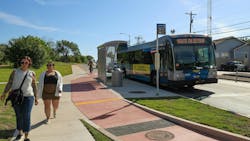EPA awards more than $272 million to four mobility projects
The Environmental Protection Agency (EPA) awarded more than $4.3 billion in grants to 25 projects through the Climate Pollution Reduction Grants program. The competitive program supports projects that will implement community-driven solutions to the climate crisis, reduce air pollution, advance environmental justice and accelerate the clean energy transition in the U.S.
“President Biden believes in the power of community-driven solutions to fight climate change, protect public health and grow our economy. Thanks to his leadership, the Climate Pollution Reduction Grants program will deliver unprecedented resources to states, local governments and Tribes to fund the solutions that work best in their communities,” said EPA Administrator Michael S. Regan. “Selected recipients have put forward ambitious plans to advance sustainable agriculture, deploy clean industrial technologies, cut emissions and energy costs in homes and commercial buildings and provide cost- and energy-efficient heating and cooling to communities, creating economic and workforce development opportunities along the way.”
EPA notes the combined reduction in greenhouse gas pollution from the selected projects could be as much as 971 million metric tons of carbon dioxide equivalent by 2050. This is the equivalent of the emissions from 5 million average homes’ energy use each year for more than 25 years.
Four of the projects, awarded a combined $272.47 million, have multimodal tie-ins. One of these selected projects is the city of Austin, Texas, which was awarded more than $57.8 million to support the coordination of a regional approach to expand transit service and develop consolidated information resources for citizens. EPA says this selected application will benefit low-income and disadvantaged communities across five counties in anticipation of the construction of a multimodal transportation network, including a light-rail system.
"The Austin region is on the brink of an exciting and positive new era of mobility with the infusion of billions of dollars into transportation projects but transformational change will bring some disruption along the way,” Austin Mayor Kirk Watson said. “Working with our regional coalition of transportation agencies, we plan to use this grant to make our transition a little easier and more pleasant for our residents with timely traveler information while also promoting adoption of transit, carpooling and active transportation, leading to long-lasting impacts on congestion and achieving our mobility and pollution reduction goals."
EPA says the project will expand transit connectivity across central Texas, leading to shorter wait times for transit and reduced travel costs; provide enhanced first- and last-mile mobility options through expansion of the local electric bikeshare system and micromobility choices; construct large-scale bicycle storage at 16 mobility hubs, provide incentives for residents to use vanpool programs, ridesharing and bike share programs, including transit fare subsidies, and reduce vehicle-miles-traveled and increase equity by improving transit and mobility infrastructure in low-income and disadvantaged communities.
In addition to the city of Austin’s grant, additional projects with mobility tie-ins include:
- $49.98 million to the city of New Orleans, La., to support the city’s efforts in reducing greenhouse gas emissions across multiple sectors by improving access to non-vehicle transportation, supporting adoption of energy efficiency measures in large buildings, installing rooftop solar panels and implementing urban forestry programs.
- $99.99 million to the Metropolitan Planning Organization for Central Arkansas (Metroplan), which will support Metroplan, the Northwest Arkansas Regional Planning Commission and the city of Fort Smith, Okla., in their transition to clean energy in Arkansas and Oklahoma. Under the grant, the coalition will fund the implementation of shovel-ready, impactful and transformative projects, including the development of green networks to restore lands and promote active transportation and transit. The selected application will support the transition to efficient and electrified transportation and improve building efficiency.
- $74.7 million to the Utah Department of Environmental Quality to support reducing greenhouse gas emissions across multiple sectors and providing benefits across the state, particularly to low-income and disadvantaged communities. The selected application will fund activities focused on transportation (electric vehicles, charging infrastructure and alternative transportation such as bikes and transit), solar power generation, oil and gas methane reduction and commercial and industrial efficiency upgrades. It will enable investment in measures, practices and technologies that reduce greenhouse gas emissions, create high-quality jobs, spur economic growth and enhance the quality of life for all Utahns.
EPA says it made its selections through a rigorous grants competition that was designed to be fair and impartial. The agency reviewed nearly 300 applications that were submitted by entities from across the country and requested a total of nearly $33 billion in funding.
More information on the selected projects is available through EPA’s website.
About the Author

Mischa Wanek-Libman
Group Editorial Director
Mischa Wanek-Libman is director of communications with Transdev North America. She has more than 20 years of experience working in the transportation industry covering construction projects, engineering challenges, transit and rail operations and best practices.
Wanek-Libman has held top editorial positions at freight rail and public transportation business-to-business publications including as editor-in-chief and editorial director of Mass Transit from 2018-2024. She has been recognized for editorial excellence through her individual work, as well as for collaborative content.
She is an active member of the American Public Transportation Association's Marketing and Communications Committee and served 14 years as a Board Observer on the National Railroad Construction and Maintenance Association (NRC) Board of Directors.
She is a graduate of Drake University in Des Moines, Iowa, where she earned a Bachelor of Arts degree in Journalism and Mass Communication.
